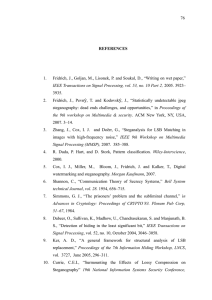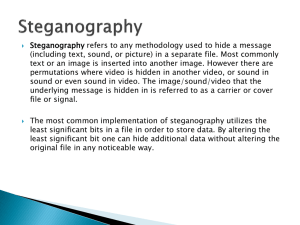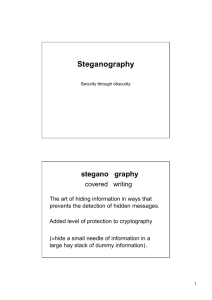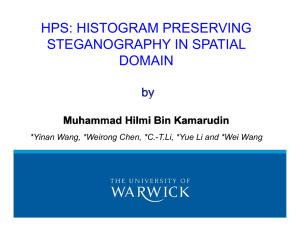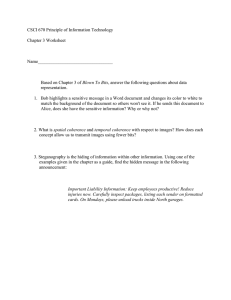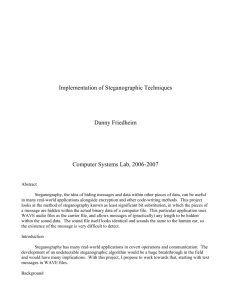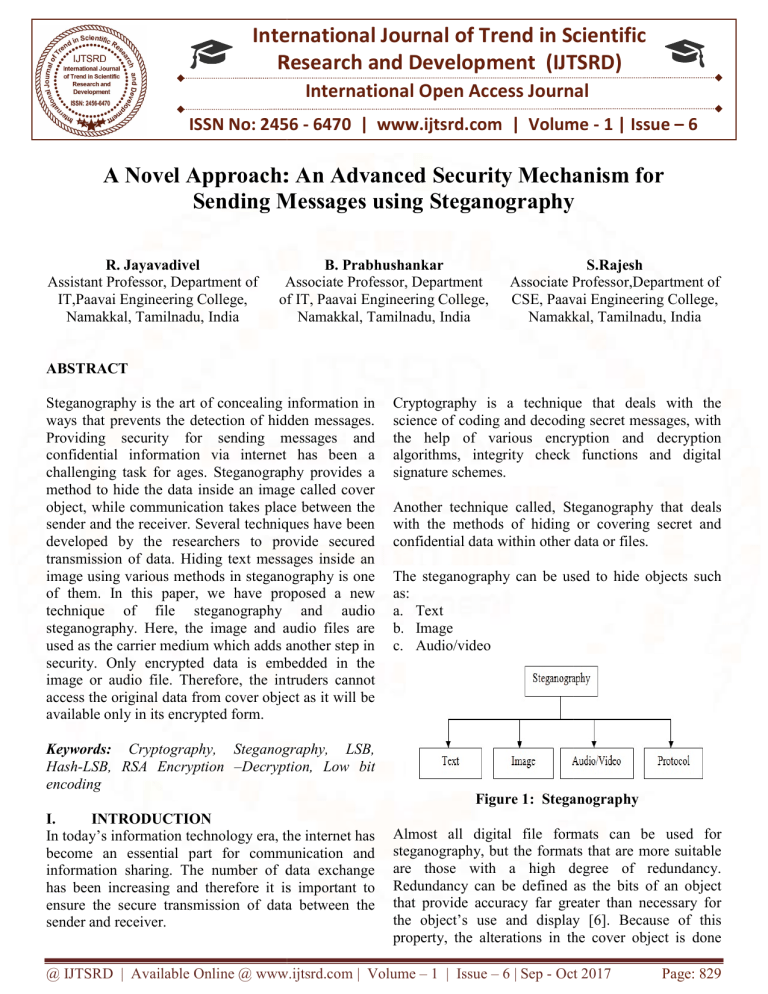
International Journal of Trend in Scientific
Research and Development (IJTSRD)
International Open Access Journal
ISSN No: 2456 - 6470 | www.ijtsrd.com | Volume - 1 | Issue – 6
A Novel Approach: An Advanced Security Mechanism for
Sending Messages using Steganography
R. Jayavadivel
Assistant Professor, Department of
IT,Paavai Engineering College,
Namakkal, Tamilnadu, India
B. Prabhushankar
Associate Professor, Department
of IT, Paavai Engineering College,
Namakkal, Tamilnadu, India
S.Rajesh
Associate Professor,Department of
CSE, Paavai Engineering College,
Namakkal, Tamilnadu, India
ABSTRACT
Steganography is the art of concealing information in
ways that prevents the detection of hidden messages.
Providing security for sending messages and
confidential information via internet has been a
challenging task for ages. Steganography provides a
method to hide the data inside an image called cover
object, while communication takes place between the
sender and the receiver. Several techniques have been
developed by the researchers to provide secured
transmission of data. Hiding text messages inside an
image using various methods in steganography is one
of them. In this paper, wee have proposed a new
technique of file steganography and audio
steganography. Here, the image and audio files are
used as the carrier medium which adds another step in
security. Only encrypted data is embedded in the
image or audio file. Therefore, the intruders
truders cannot
access the original data from cover object as it will be
available only in its encrypted form.
Keywords: Cryptography, Steganography, LSB,
Hash-LSB, RSA Encryption –Decryption,
Decryption, Low bit
encoding
I.
INTRODUCTION
In today’s information technology era, the internet has
become an essential part for communication and
information sharing. The number of data exchange
has been increasing and therefore it is important to
ensure the secure transmission of data between the
sender and receiver.
Cryptography is a technique that deals with the
science of coding and decoding secret messages, with
the help of various encryption and decryption
algorithms, integrity check functions and digital
signature schemes.
Another technique called, Steganography
Steganograp that deals
with the methods of hiding or covering secret and
confidential data within other data or files.
The steganography can be used to hide objects such
as:
a. Text
b. Image
c. Audio/video
Figure 1: Steganography
Almost all digital file formats can be used for
steganography, but the formats that are more suitable
are those with a high degree of redundancy.
Redundancy can be defined as the bits of an object
that provide accuracy far greater than necessary for
the object’s use and display [6]. Because of this
property, the alterations in the cover object is done
@ IJTSRD | Available Online @ www.ijtsrd.com | Volume – 1 | Issue – 6 | Sep - Oct 2017
Page: 829
International Journal of Trend in Scientific Research and Development (IJTSRD) ISSN: 2456-6470
without damaging it and the embedded message will
not be revealed easily. In this project, the image
steganography and audio steganography are done with
the help of LSB insertion and Low bit coding
techniques respectively.
II.
RELATED WORK
Several methods and techniques have been developed
to hide text messages inside image files. For example:
RSA algorithm and LSB insertion method can be used
in embedding the messages inside an image. The most
widely used technique to hide data is the usage of the
LSB [1]. The existing techniques are mainly based on
LSB (Least Significant Bit) where LSBs of the cover
file are directly changed with message bits. In [3], two
steganography techniqueshad been proposed for
hiding image in an image using LSB method for 24
bit color images. Mohmmad A.Ahmed et al, in [2],
proposed a method in which a message hidden inside
an image by using the Least Significant Bit (LSB)
technique and after creation of the hidden message,
the image will pass it in hash function to obtain
hashing value using the MD5 technique. In [4], [5],
[7], [8] and [10], designing of robust and secure
image steganography based on LSB insertion and
RSA encryption technique has been used.
In[6],Obaida Mohammad Awad Al-Hazaimeh,
proposed that the inserting of message bits into the
image is not only in the least bit but also the other bits
in the pixel in the random manner. This can be done
by comparing the message bit to the pixel bit
randomly chosen from second to the last bit.
III.
EXISTING TECHNIQUE USED
A. LSB Insertion Method
LSB insertion method is the simplest and the secure
method used in steganography to embed message
content inside a cover image. It embeds the bits of the
message directly into least significant bit plane of the
cover-image in a deterministic sequence. In this
technique, the embedding capacity can be increased
by using two or more least significant bits.
At the same time, not only the risk of making the
embedded message statistically detectable increase
but also the image fidelity degrades. The advantage of
the LSB - based method is easy to implement and
high message payload. And also, LSB hides the
message in such way that the humans do not perceive
the hidden content.
IV.
PROPOSED TECHNIQUE
The Proposed system is intended to give an overview
of image Steganography and Audio Steganography. It
also attempts to identify the requirements of a good
Steganography algorithm and briefly reflects on
identifying which steganography techniques are more
suitable for which applications.
A. Image Steganography
Hiding secret information using images is one of the
most popular choices for Steganography. There have
been many techniques for hiding information or
messages in images in such a manner that alteration
made in the image is perceptually indiscernible.
Common approaches include LSB insertion method,
Masking and filtering and Transform techniques.
Figure 2: Image Stegnography
B. Audio Steganography
Data hiding in audio signals is especially challenging,
because the Human Auditory System (HAS) operates
over a wide dynamic range. The HAS perceives over
a range of power greater than one billion to one and a
range of frequencies greater than a thousand to one.
Sensitivity to additive random noise is also acute.
The perturbations in a sound file can be detected as
low as one part in ten million which is 80dB below
ambient level. However, there are some ‘holes’
available. While the HAS has a large dynamic range,
it has a fairly small different range.
As a result, loud sounds tend to mask out the quieter
sounds. Additionally, the HAS is unable to perceive
absolute phase, only relative phase. Finally, there are
some environmental distortions as common as to be
@ IJTSRD | Available Online @ www.ijtsrd.com | Volume – 1 | Issue – 6 | Sep - Oct 2017
Page: 830
International Journal of Trend in Scientific Research and Development (IJTSRD) ISSN: 2456-6470
ignored by the listener in most cases.
Figure 3: Audio Stegnography
hidden it that. If the user selects decrypt, the
application gives the screen to select only image file
and ask path where user want to save the secrete file.
Before encrypting file inside image must to save the
name and size of files in a definite place of the image.
Save file name before file information in LSB layer
and save file size and file name, size in most rightdown pixels of the image. Writing this information is
needed to retrieve files from an encrypted image in
decryption state.
Original image
C. Low Bit Encoding
Stego image
Low-bit encoding is the one of the simplest way to
embed data into other data structures. By replacing
the least significant bit of each sampling point by a
coded binary string, it can encode a large amount of
data in an audio signal. Sampling technique followed
by Quantization converts analog audio signal to a
digital binary sequence. In this technique LSB of
binary sequences of each sample of digitized audio
file is replaced with the binary equivalent of a secret
message.
V. IMPLEMENTATION
ANALYSIS
AND
REPORT
The File Stegano module is used to hide files into the
image no one can see that file. It has two options
encrypt and decrypt. First select encrypt tab, the
application gives the screen to select the image file,
information file and option to save the image file. For
encryption LSB bit are used to write our security
information inside image. So use the last layer (8st
layer) of information, change the last bit of pixels. In
other hands 3 bits in each pixel, so 3*high*width bits
memory to write our information. But before writing
our data write name of the data (file), size of name of
data & size of data, by assigning some first bits of
memory (8st layer) using each 3 pixels of picture to
save a byte of data.
The decrypt is used to get the hidden information in
an image file. It takes the image file as an output, and
give two files at destination folder, one is the same
image file and another is the message file that is
An audio format is a medium for storing sound and
music. It is a container format for storing audio data
on a computer system. There are numerous file
formats for storing audio files. WAV is a flexible file
format designed to store more or less any combination
of sampling rates or bit rates. This makes it an
adequate file format for storing and archiving an
original recording.
In audio Stegano module, during encryption, the first
step is selecting an input audio file. The selection is
made through opening a new dialog box and the path
selected is displayed through a textbox. The second
step is selecting a key file. The third step is choosing a
text file or typing any text message for embedding. In
the fourth step, whatever the files that selected are
viewed and verification of the path is done. In the
fifth process data is embedded into the audio file
using low bit encoding technique. After embedding
the content, both the audio files are played and a
listener cannot find any difference between the
audios.
In decryption, the first step is the process of selecting
the encrypted audio file. This is the file that a user has
to extract information from the output audio. The
@ IJTSRD | Available Online @ www.ijtsrd.com | Volume – 1 | Issue – 6 | Sep - Oct 2017
Page: 831
International Journal of Trend in Scientific Research and Development (IJTSRD) ISSN: 2456-6470
symmetric encryption method is used here, so the key
selected during the embedding process is used in
decrypting the message. Second process involved in
selecting a new text file to display the embedded
message. All the process done embedded message are
displayed on a list box and finally the embedded
message can be viewed with the help of a file or in a
textbox.
CONCLUSION
In this paper, new Steganographic systems are
proposed to enhance the security of Steganographic
system by using both the image and audio as carrier
medium to hide the contents. Thus, we expect that the
proposed technique will be efficiently used in
Steganographic systems or considered as a good
alternative to other technique because of the high
level of security.
REFERENCES
1) ien Hong, Tung-Shou Chen, “A Novel Data
Embedding Method Using Adaptive Pixel Pair
Matching”, IEEE Transactions on Information
Forensics and Security, Vol. 7, Issue No. 1, Pages
No. 176 - 184, Feb., 2012.
2) Mohammad A. Ahmad, Dr. ImadAlshaikhli,
Sondos O. Alhussainan, “Achieving Security for
Images by LSB and MD5”, Journal of Advanced
Computer Science and Technology Research, Vol.
2, Issue No.3, Pages No. 127-139, Sept., 2012.
6) Obaida Mohammad Awad Al-Hazaimeh, “Hiding
Data in Images Using New Random Technique”,
IJCSI International Journal of Computer Science
Issues, Vol. 9, Issue No. 4, No 2, July 2012.
7) Samir Kumar Bandyopadhyay, SarthakParui, “A
Method
for
Public
Key
Method
of
Steganography”,
International
Journal
of
Computer Applications, Vol. 6, Issue No. 3, Sept.,
2010.
8) Shailender Gupta, AnkurGoyal, Bharat Bhushan,
“Information Hiding Using Least Significant Bit
Steganography and Cryptography”, I. J. Modern
Education and Computer Science, Vol. 6, Pages
No. 27-34, 2012.
9) Anil Kumar *, Rohini Sharma, “A Secure Image
Steganography Based on RSA Algorithm and
Hash-LSB Technique”,International Journal of
Advanced Research in Computer Science and
Software Engineering, Volume 3, Issue 7, July
2013.
10) Deepali, “Steganography with Data Integrity”,
International
Journal
of
Computational
Engineering Research, Vol. 2, Issue No. 7, 2012.
3) DeepeshRawat,
VijayaBhandari,
“ASteganography Technique for Hiding Image in
an Image using LSB Method for 24 Bit Color
Image”, International Journal of Computer
Applications, Vol. 64, Issue No. 20, Feb., 2013.
4) MamtaJuneja,
Parvinder
Singh
Sandhu,
“Designing of Robust Image Steganography
Technique Based on LSB Insertion and
Encryption”,
International Conference on
Advances
in
Recent
Technologies
in
Communication and Computing, Pages No. 302 –
305, 27-28 Oct., 2009.
5) Swati Tiwari, R. P. Mahajan, “A Secure Image
Based Steganographic Model Using RSA
Algorithm and LSB Insertion”, International
Journal of Electronics Communication and
Computer Engineering (IJECCE), Vol. 3, Issue
No. 1, 2012.
@ IJTSRD | Available Online @ www.ijtsrd.com | Volume – 1 | Issue – 6 | Sep - Oct 2017
Page: 832

